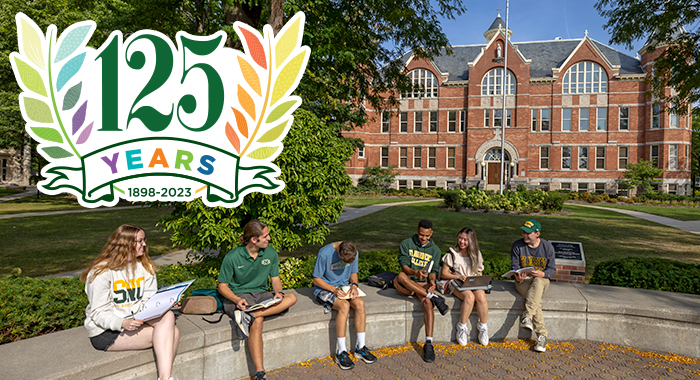St. Norbert College at 125: Nurturing Legacy and Sustaining Purpose
St. Norbert College marked a significant milestone this October — its 125th anniversary. From its humble beginnings, the college has not only withstood the test of time, it has also evolved to meet the ever-changing needs of students and the local community.
“Being part of an institution that has been around that long is pretty special because you’re part of something that has the ability to persist that long and has served so many people over the years,” says the Rev. Matthew Dougherty ’09 (Biology). “It means there’s something going right. And it also means that there’s an added opportunity to really make sure it goes another 125 years.”
An enduring mission
At the heart of the college’s strength and longevity is its tripartite mission as a Catholic, Norbertine, liberal arts college, says Dougherty, a graduate of St. Norbert who went on to join the Norbertine order and now serves as an assistant professor of biology and as college chaplain at his alma mater.
President Laurie Joyner agrees, noting the importance of the intersection of all three elements of the college’s mission.
“What’s truly most exciting is that area of overlap,” she says. “To me, the more we can align and work as a college on that sweet spot that brings all three together, I think that’s when we’re really in the flow as an institution.”
But our true measure of success is who our graduates become, Joyner says: “When you actually see who they’ve become and how they reflect on their experiences, it gives your life meaning. It just reminds you of why you’ve devoted your whole life to [this work].”
Matthew Scheele ’24 says he feels the impact of the students who came before him.
“To know that I walk the same halls that students have for decades, many of which have gone on to do great things in life, is a humbling and inspiring experience,” he says. “Not only does it push me to represent the college in a similar way, but it encourages me to foster the same sense of community that I was met with as a freshman for incoming classes.”
That sense of community is what sets St. Norbert apart, Joyner says. “That's what's different about this place. People are accepting and welcoming and embrace you.”
A history of resilience
St. Norbert College had an unassuming start. The Rev. Bernard Pennings, a Dutch immigrant priest, founded the college in 1898 to train young men for the priesthood. It wasn’t long before Pennings recognized a pressing need for higher education in northeastern Wisconsin. The college expanded its horizons, introducing a commerce program for lay students. In 1952, another transformative step was taken, making St. Norbert College a coeducational institution. Today, it stands strong, enrolling around 1,900 students in more than 80 undergraduate programs and three graduate programs.
“There were moments in our history, like any great organization, when things were going really well. And there were other moments where there were real struggles, real threats,” Joyner says. “What I take from that is that this institution is incredibly strong and resilient. It adapts and innovates in different ways at different moments. … As an educational ministry of the Catholic Church, our commitment is to meet the most pressing needs around us.”
Adapting to meet the community’s needs is a thread woven throughout the college’s 125-year history. It’s a thread that will help weave the next 125 years, Dougherty says.
“I think part of it comes from the old phrase that St. Augustine has used, ‘ever ancient, ever new,’” Dougherty says. “We have this 125-year tradition, and it comes with a lot. … A big thing is to know what in that is enduring and what in that can really come anew? There’s an ancient part to it that we want to hold onto. And there’s a new part – that we want to adapt [our] mission to current needs and current context.”
Carrying forward the college and its mission is not a responsibility that President Joyner takes lightly. “It just makes the weight of the responsibility, the privilege of the responsibility, that much greater to know that under no circumstances will anything other than this place thriving into the future be acceptable,” she says.
Oct. 25, 2023












